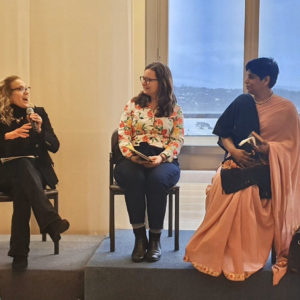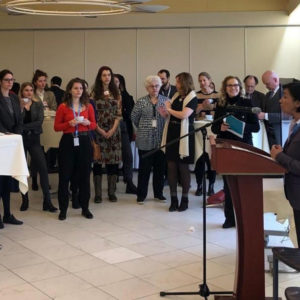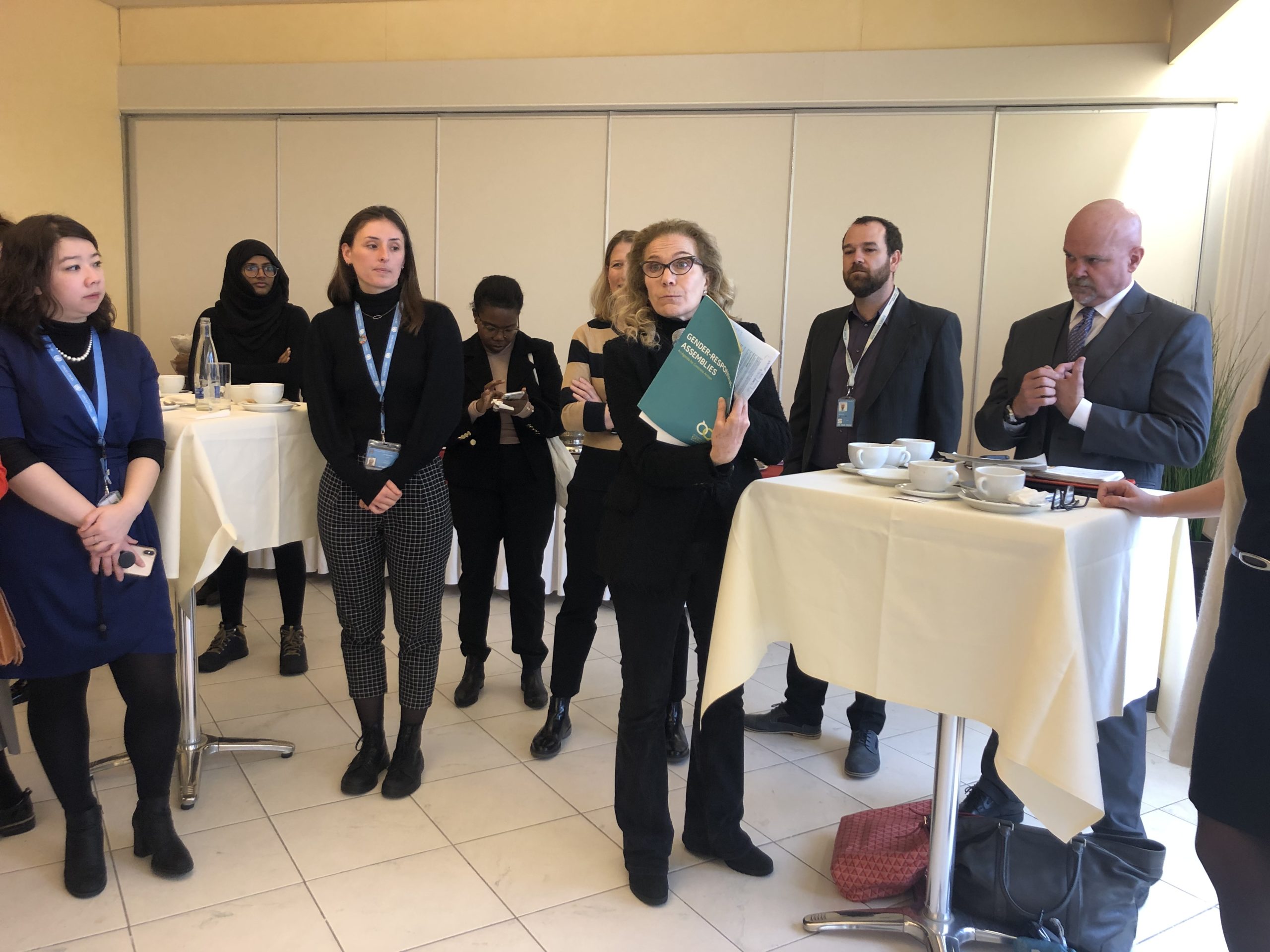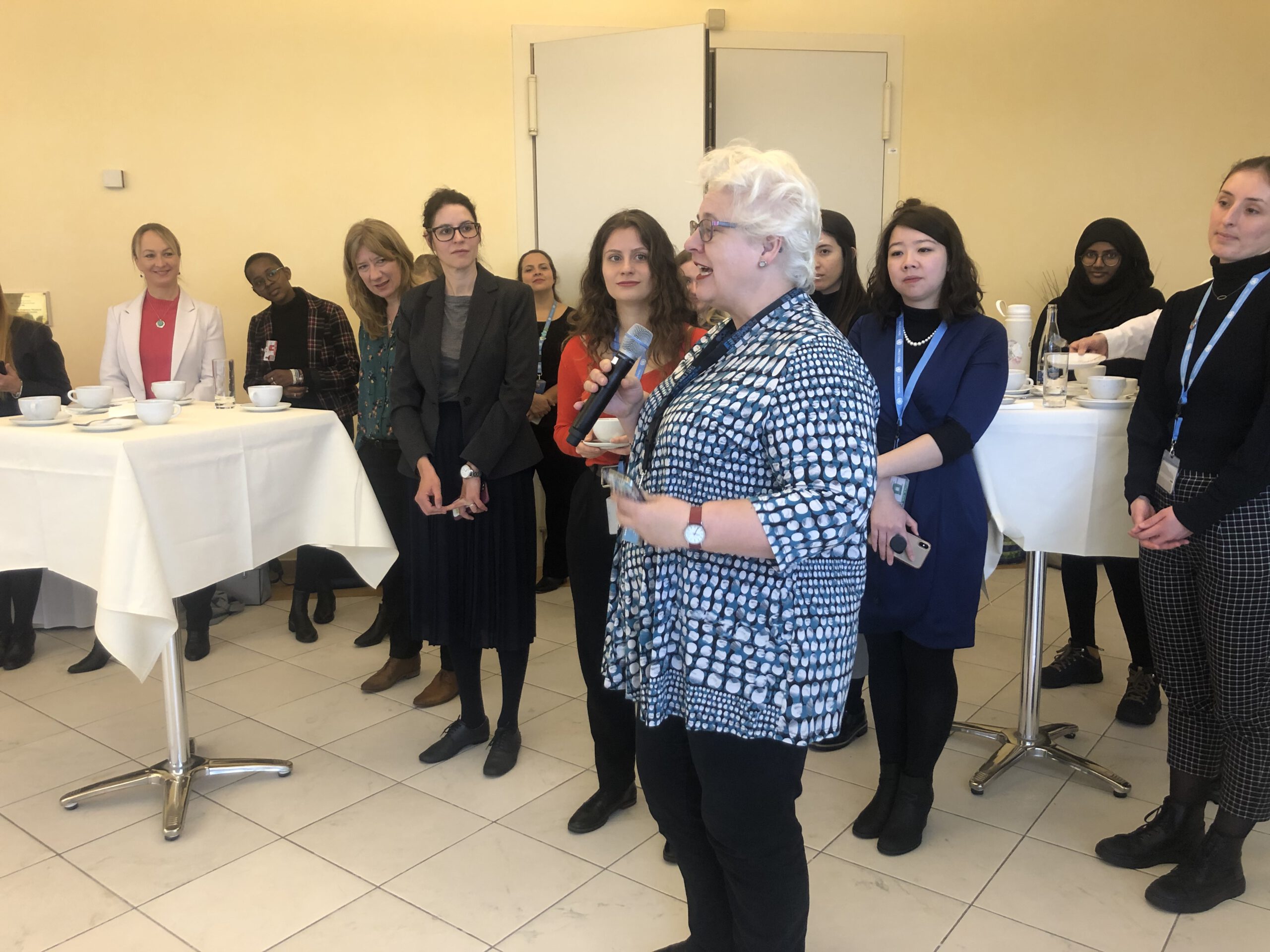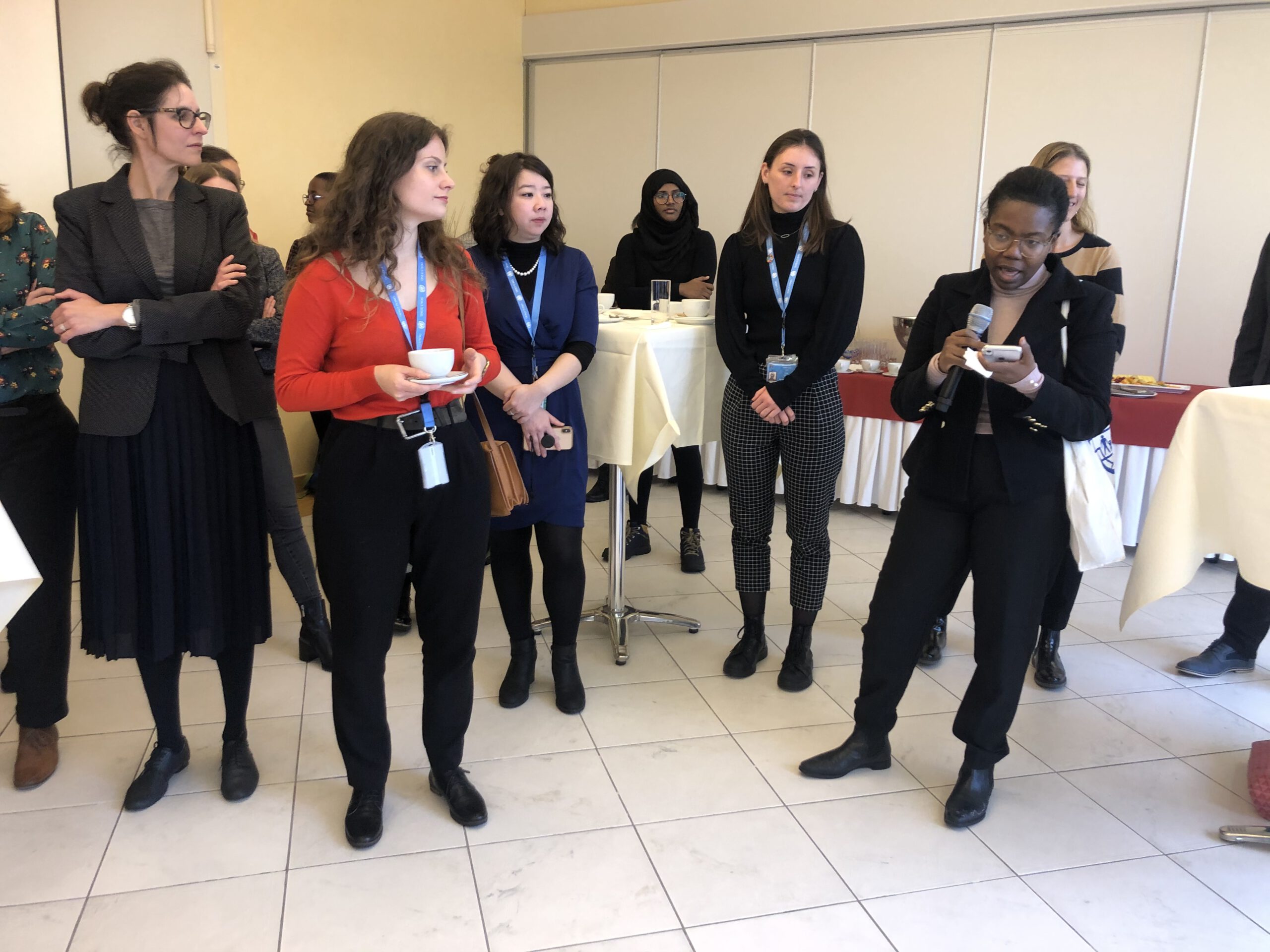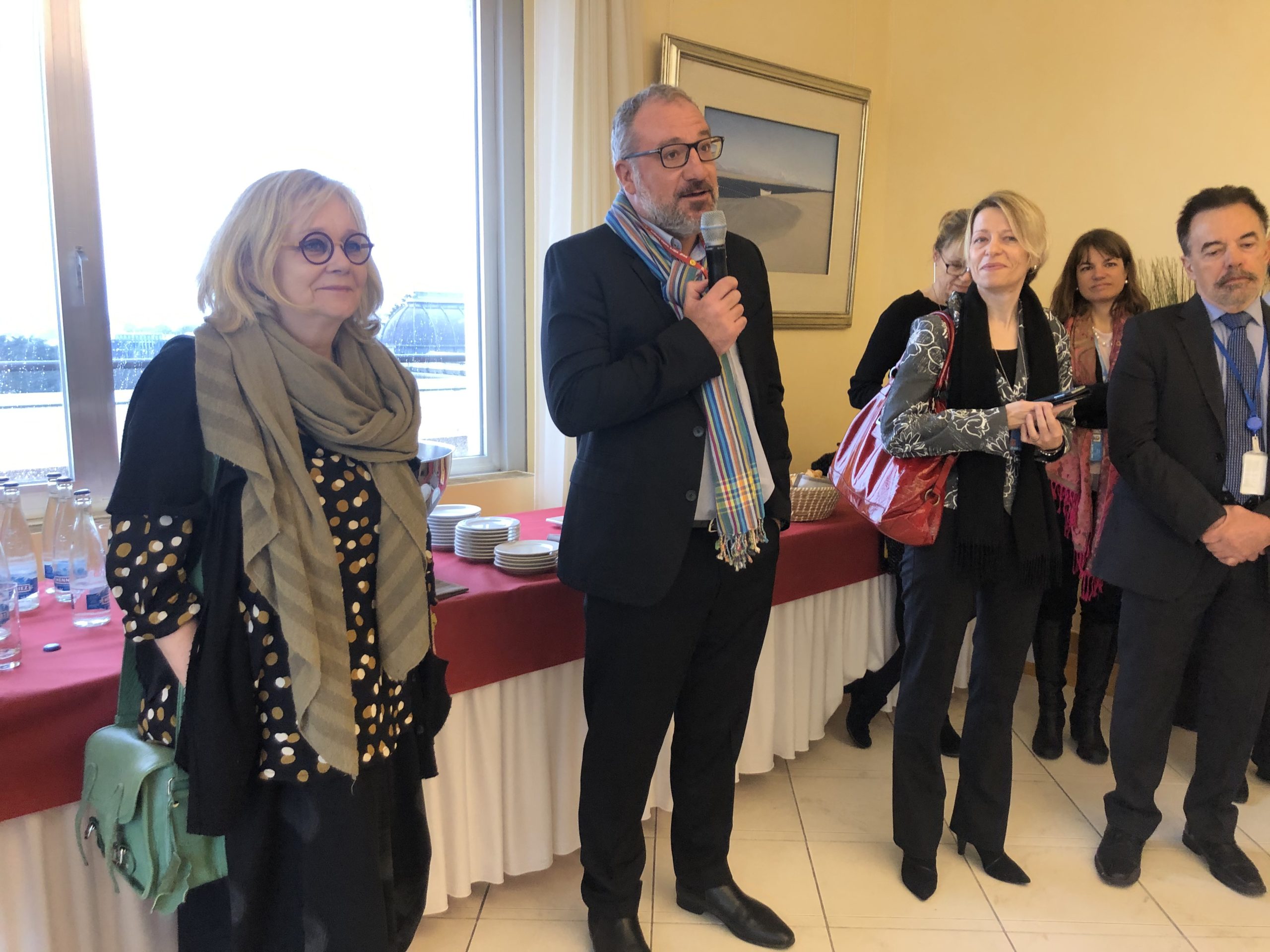Event Conference
International Women’s Day | Climate Justice / Gender Justice
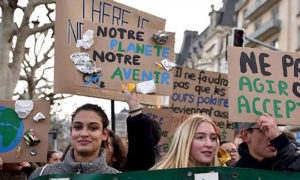
05 Mar 2020
08:30–10:00
Venue: Palais des Nations | Restaurant des délégués
Organization: Geneva Environment Network
On the occasion of International Women’s Day, the Geneva Environment Network Secretariat and Women at the Table organized a breakfast discussion on the gender approach to climate justice. The event was held on 5 March at the Restaurant des délégués, Palais des Nations.
About this Session
This discussion featured Ambassador Nazhat Shameen Khan, the COP23 chief negotiator for Fiji, in conversation with climate activist and university student activist, Marie-Claire Graff, regarding the COP process, the possibilities and pitfalls. Participants then reflected on the critical role of women in response to leading and driving solutions for climate change, the lessons learnt across the feminist movement that can be applied to the climate movement, and gender equality and gender justice in the Climate agenda.
The event was organized ahead of the “Generation Equality Forum” to be held in May and July 2020 and convened by UN Women and co-hosted by the governments of Mexico and France.
Agenda
Opening remarks
H.E. Amb. Socorro Flores Liera, Permanent Representative of Mexico to the United Nations Office and other international organizations in Geneva
François Gave, Deputy Permanent Representative of France to the United Nations Office and other international organizations in Geneva
Dialogue on Climate Justice / Gender Justice – Thoughts on feminist action for climate action in the run-up to the Generation Equality Forum
H.E. Amb. Nazhat Shameem Khan, Permanent Representative of the Republic of Fiji to the United Nations in Geneva
Marie-Claire Graf, Vice-President, Swiss Youth for Climate
Moderation: Caitlin Kraft, Founder and CEO, Women@theTable
Summary
Opening remarks
H.E. Amb. Socorro Flores Liera, Permanent Representative of Mexico to the United Nations Office and other international organizations in Geneva
- “What a good year that we are going to celebrate today, the Generation Equality Forum, where France and Mexico are partnering with UN Women and we will need the action of all to make sure that women’s rights are there and that we can work to advance these rights.”
- “Yesterday, I was reading the new UN Women’s report, (…), and you can see how much backlash we are having on women’s rights. This shows that we need active participation, we need active coalitions and this is what the Generation Equality Forum will try to achieve.”
- “We are going to be discussing during this year how we can strengthen action to make sure that women’s rights all over the world are recognized, not only in a declaration, but also in the action.”
- “What we really need are coalitions of action in different parts of the world where we can work so that we make sure that equality is a reality.”
- “In the framework of climate justice, (…), we are in a very good moment (…) to make visible the harm of climate change to women and highlight the importance of gender equality and gender empowerment for effective action.”
- We didn’t deliver good results at COP25, but at least there was a Gender Action Plan and this is good news because it shows that there is commitment, interest and political will to move the Gender agenda.
- “We have to keep working, we have to embrace every opportunity to work together and this is what the Generation Equality Forum will do.”
- “There is a cross-cutting issue precisely on environment and women that I am sure we are going to have your participation in. the fact that we are today in a room full of women and men show the importance that we give to this agenda.”
François Gave, Deputy Permanent Representative of France to the United Nations Office and other international organizations in Geneva
- “We need to look at the intersection of the climate justice agenda and the gender justice agenda, and it is important to emphasize (…) that there is indeed a big intersection.”
- “In both areas you have much progress, but it is very uneven, and in both areas there are pushbacks. We have to be cautious and we have to take those agendas forward. The more communalities we find, the more synergies we find, the better.”
- “We have great expectations for this Forum. (…) The two main parts are about takings tock of what has been done, but the most important part is in really going forward.”
- “As you know climate change impacts everybody, but it impacts women more than men. Partly because, especially in poorer countries and rural areas, women are more likely to experience poverty, they are more vulnerable (…). Approximately 80% of people displaced by climate change are women.”
- “We know that empowering women is key for building better climate change policies, this is another reason why we need really to advance on both agendas.”
- “Climate justice and gender justice are closely connected.”
Dialogue on Climate Justice / Gender Justice – Thoughts on feminist action for climate action in the run-up to the Generation Equality Forum
Moderated by: Caitlin Kraft, Founder and CEO, Women@theTable
- You cannot have climate justice without gender justice and the leading role women have in the climate agenda,
- “If we leave 50% of the population off innovations, it means we are not operating at full capacity”
- “We say feminists who are men and women. It is a point of view, it is not only women themselves that carry the whole fight for gender, it is people who are progressive, who have a social justice agenda.”
H.E. Amb. Nazhat Shameem Khan, Permanent Representative of the Republic of Fiji to the United Nations in Geneva
- Fiji at the birth of the gender action plan
- “If we look at what gender justice really is, it is all about addressing inequality and understanding where it comes from, the fact that it comes from institutional, legal, social and cultural barriers.”
- “If we look at these barriers, in relation to the lives of women. If we look at the way that those barriers create inequality in reality, in the way that women live their lives. We see the stress on food security, on water, on livelihoods, (…) then we see the impact of climate change on that existing inequality.”
- “Gender justice and climate justice are synonymous in this context, because you can’t really address the issue of climate change nationally and internationally, unless you face this truth that there is an inherent inequality in relation to women.”
- “On the one hand, women are disproportionately affected by the impacts of climate change. (…) But then, we know that women are not at the table when it comes to designing climate policy. So, women’s experiences tell them how vulnerable they are, and how they could be empowered if only they were given a say and they are not given a say.”
- “We knew these inequalities, we saw them, and we were addressing them in Fiji against very difficult barriers: for instance, culturally, if you go into a traditional setting, you are not going necessarily to see any women at all in a village which is likely going to be relocated. How do you then recraft this conversation to include women?”
- “I see the Gender Action Plan as a way in which we confront these inequalities and we then address it both nationally and internationally.”
- “There are five priority areas for an effective implementation of a gender justice program for climate. At the top of the list is capacity-building, but also, secondly, is leadership: until we do not have more women at the COP, until we do not have them in delegations, until we agree on ways in which to persuade governments to send women so that they are part of the negotiating table, we are not going to address this issue of inequality in relation to climate policy.”
- Furthering Gender Action Plan has been an achievement for our COP23 presidency
- Launch of the Indigenous Peoples and Local Communities Platform, synergy with GAP
- “The experiences of women from local communities and indigenous communities are really central to this conversation because they are disproportionately affected by the effects of disasters and of climate change. The voices of indigenous women became very loud at our COP, we encouraged it, we wanted to hear this and hats off for Canada for facilitating that voice and that a continuation, I don’t see indigenous peoples going back into the box after having had their say”
- “I think the Gender Action Plan is a language of empowerment, not of enablement. We empower women to have a say in climate policy and, in empowering them, we make all women’s experiences in relation to climate change visible. We are able to talk about them and in doing so we are on the cusp of this great discovery of equality.”
- “The UNFCCC has prepared a paper (…) on the effectiveness of the Gender Action Plan for reporting back to the next COP26, in Glasgow. When you look at that paper, much of the concern is for implementation at the national level, how is this going to work for women on the ground. I think that is a very good focus, I think if the discussions at the next COP were about what to do with the Gender Action Plan, (…) what is its life, (…). Always keeping women at the table would be a great outcome for the UK COP.”
- How to address women in delegations? – there is a slight improvement
- Some years ago, Australia run a workshop specifically for Pacific women negotiators, resulting in many countries having the only negotiations’ training there – for some Pacific countries the only negotiator is a woman
- “I would say to the next COP: devise strategies to get more women to the COP, devise strategies to make sure that they are in leadership positions, and work on an outcome that will keep GAP on the agenda regularly.”
- “Climate financing is difficult to access, for members of local communities in particular, and terribly controversial, where the money is coming from, who is paying, is this loss and damage are difficult conversations in the context of climate justice. Yet they are the most important. If we are going to empower women from local communities, then you have to improve access to climate funds.”
- There is a huge gap between climate funding and development funding and many gender-related projects might be seen by the Green Climate Fund as development projects and not climate projects
- Alternative sources of funding should be explored
- “When we had the Presidency of the COP23, we had an informal consultative process with all of civil society and of the civil society giants in the climate world, there were none specifically on gender justice and climate.”
- “Some of the champions for gender justice and climate were member states. They were the ones saying: “You really need to get an outcome on gender.”
- Civil society needs more leadership on the topic, they have to make the GAP as a priority
- Looking at the submissions to UNFCCC on the effectiveness of GAP, a large number of civil society environmental groups are behind them
- “There should be almost a daily briefing from civil society to the Presidency. (…) You come out of the fraught atmosphere of the negotiating room and you hear the voices of people, because civil society often is the only voice of people that you may hear.”
- “Communication is sitting in a room and asking: “What do you want us to deliver? What are civil society’s concerns?”
Marie-Claire Graf, Vice-President, Swiss Youth for Climate
- “If you go outside and talk to the negotiators on the financial mechanism, or on technology transfer, there is very little understanding of what we are doing on the GAP and sometimes it is side lined, as if the GAP is not really important.”
- “We have the Gender Action Plan, now we need to go one step further and mainstream women empowerment and quality training for women in delegations. (…) If we really want to empower women, we have to involve them from the beginning and also give them training which fits their needs, especially young women.”
- “We need to bring the topic to the high-level, as we have seen in the previous years that topics who were discussed by ministers or presidents in the high-level segments, were better mainstreamed in various policies.”
- “We cannot only stick with international policies, we have to bring it down to the national level within National Action Plans, National Determined Contributions, which should be updated this year.”
- Make sure that NDCs include gender responsive climate actions, youth engagement, …
- The Climate Technology Centre (CTC) released Gender Just Climate Solutions and try to encourage women to apply for funding, but “programs are decided by men, designed by men, not on purpose, but on the ground men can access the money more easily.”
- What makes the civil society representatives frustrated is that they prepare, they discuss, they give time and effort to a topic, but then nothing comes out of the COP on the topic
- Need for meaningful ways of integrating civil society in the discussion, the negotiations and the debate
- Italy, host of the pre-COP is organizing a youth event where each country will have two representatives to develop policy recommendations
Remarks from the audience
Dina Ionesco, IOM
- Migration helps us explode stereotypes about gender and question other things on climate
- From the COP in the future, I would like them to stop seeing migrants, especially women, as victims, but start seeing them in a positive light
- Loads of ideas: awards, art, cooperation with DDP
Gisela Duetting, UN Women
- In 1995, I was at the Beijing Conference and there we would have a briefing to civil society on the official negotiations taking place
- Women’s meaningful participation in international conferences is crucial
Rahel Steinbach, UN Women
- Design print of the Action Coalition:
- Need for leadership around climate justice
- Ownership problems
- Empowerment of youth and indigenous peoples
- Channelling of financing downwards
- Access to mitigation businesses
- Topic of empowerment and protection of climate and environmental defenders
Benjamin Schachter, UN OHCHR
- UN HRC last year mandated a study on gender and climate change
- One action I would suggest is to look at the recommendations of the study and put them into practice
- Gender Action Plan: it is a success, but also a cautionary tale – expectation of a renewal and strengthening of the GAP, but it did not happen with ease
- Parties backed away from women’s rights language in the negotiation phase
- In terms of participation, the UNFCCC does not have to employ the modalities that it employs, because they are decided by member states – need to create a new meaningful space of confrontation with civil society
At the UN Biodiversity Convention Conference, women’s rights activists speak directly in plenary and closing sessions. The same could be applied at UNFCCC
Alexis Arthur, UNDP
- Mitigation could provide one third of the climate solution and is a male dominated space
- We are working in the NDCs and we are showing that gender is in the NDCs
- Need to ensure that women and men equally participate in policy, but also benefit from it
- Climate finance needs to be channelled towards women and indigenous communities
Valentina Lourdes Sierra Dominguez, Permanent Mission of Uruguay
- National Strategy on Climate Change and Gender, presented at COP25
- Very good strategies to improve implementation
- Enhance participation and access to justice for women
- Inside the strategy there are different areas of planning related to different issues
Elise Buckle, Climate & Sustainability
- How do we make sure that we have women at the top and how do we make sure that they stay there, as COP President for instance?
H.E. Amb. Socorro Flores Liera, Permanent Mission of Mexico
- I was a climate negotiator for 5 years
- Ms. Patricia Espinosa was the leader of the Cancún Agreement negotiations and now she is Executive-Director of the UNFCCC
- Negotiations are very difficult, most notably on disarmament and on climate change
- In Cancún, for the first time, the word gender was included in a climate agreement, now we have a Gender Action Plan
- Implementation is essential, because all UN agencies have to contribute
- Need for a very clear focus
- At the Generation Equality Forum we won’t be negotiating, but we will build coalitions of governments and civil society that actually do things
Gary Lewis, UNEP
- Better targeted financing: what the COP ought to produce on the ground
- Of all the SDGs, SDG 13 is the furthest behind on gender equity
- I have seen the transformation take place in a part of Sudan where violence was common
- We brought in women in the dialogue and in the community
- Women then become vocal and contribute significantly
Laura Jung, student of Global Health and Climate
- We should talk more about health needs of women, related to sexual and reproductive health specifically
Xungileni Chitundu, Permanent Mission of Namibia
- Resolution 13/25 was initiated by Namibia
- Climate change exacerbates conflicts
- Women as leaders in decision-making
- Women should be included in emerging issues, as well as in providing solutions to increase resilience
Silja Halle, UNEP
- UNSC Resolution 13/25 is 20 years old, it remains completely climate-blind
- No impacts of climate on women nor opportunities related to climate implementation of the resolution
- Emerging area of policy around climate and security completely gender blind
- Plea for integration in the COP and outside
Bruno Pozzi, UNEP
- From COP26, as UNEP, we wish two things:
- Article 6 [related to market and non-market mechanisms for enhanced cooperation among countries to meet their NDCs]
- More ambitious NDCs
- No woman is Minister of Finance and in the negotiation room
- When you vote, think as well about who you are going to elect
H.E. George Papadatos, European Public Law Organization
- Inequality is in the international agenda, but I would narrow it down to wealth and income inequalities
- Income and wealth inequalities affect other inequalities: education, health, …
Conclusion
Marie-Claire Graf
- “The climate crisis we are currently in is man-made, not human-made, but man-made that’s why we need bold female leadership and when females get in the leadership position they do not have to become like the old-fashioned male leader. Be true to yourselves and do not give up your emotions, as we need them. This is not for females only: men, if you get in leadership positions, do not be the typical dominating man. Be open. It’s such a complex issue, such a cross-cutting issue, we need to break down these silos. (…) I am proud of men whom I can look up to and say: “He is standing up for feminism!”
H.E. Amb. Nazhat Shameem Khan
- We used to have to dialogue with male elders when discussing the need for a village to be moved because of rising sea levels
- We started to train women to bring solar energy into village through a program called “Solar Mamas”
- Now, elders call on them and engage them to get energy for their villages
- It is a transformative change
Documents
- Invitation Breakfast 5 March 2020
- Gender-Responsive Assemblies toolkit (International Gender Champions)
Video
The event was live on Facebook.
Photos
Photos © UNEP/GEN

